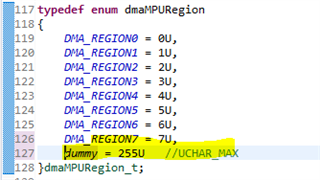Part Number: CODECOMPOSER
Other Parts Discussed in Thread: HALCOGEN
I was redirected here since my question can not be answer in the processor forum (link to original question CCSTUDIO: CCS10.2.0 (20.2.2LTS) cannot compile HALCoGen 04.07.01 generated sources anymore - Processors forum - Processors - TI E2E support forums)
Basically the problem is that with CCS 10.1.1 (ti-cgt-arm_20.2.1.LTS) the HALCoGen generated source compile fine with super strict settings (the relevant for this here are --strict_ansi, --diag_error=2142 and --emit_warnings_as_errors) and since CCS 10.2.0 (ti-cgt-arm_20.2.2.LTS) some files do no longer compile.
You can use the example QJ Wang posted in my original question and compile like this:
To get the error the compiler is now producing for ti-cgt-arm_20.2.2.LTS and ti-cgt-arm_20.2.4.LTS just run (#2142-D: comparison between signed and unsigned operands):
C:\ti\ccs1030\ccs\tools\compiler\ti-cgt-arm_20.2.4.LTS\bin\armcl.exe --silicon_version=7R5 --code_state=32 --float_support=VFPv3D16 -g --diag_wrap=off --display_error_number --enum_type=packed --abi=eabi --c99 --strict_ansi -O3 --diag_error=2142 --emit_warnings_as_errors --compile_only --include_path=include --include_path="C:\ti\Hercules\F021 Flash API\02.01.01\include" --include_path=C:\ti\ccs1030\ccs\tools\compiler\ti-cgt-arm_20.2.4.LTS\include source\HL_sys_dma.c --output_file=HL_sys_dma.obj
We suspect the the enum handling must have changed and a regression was introduced in the last update.


